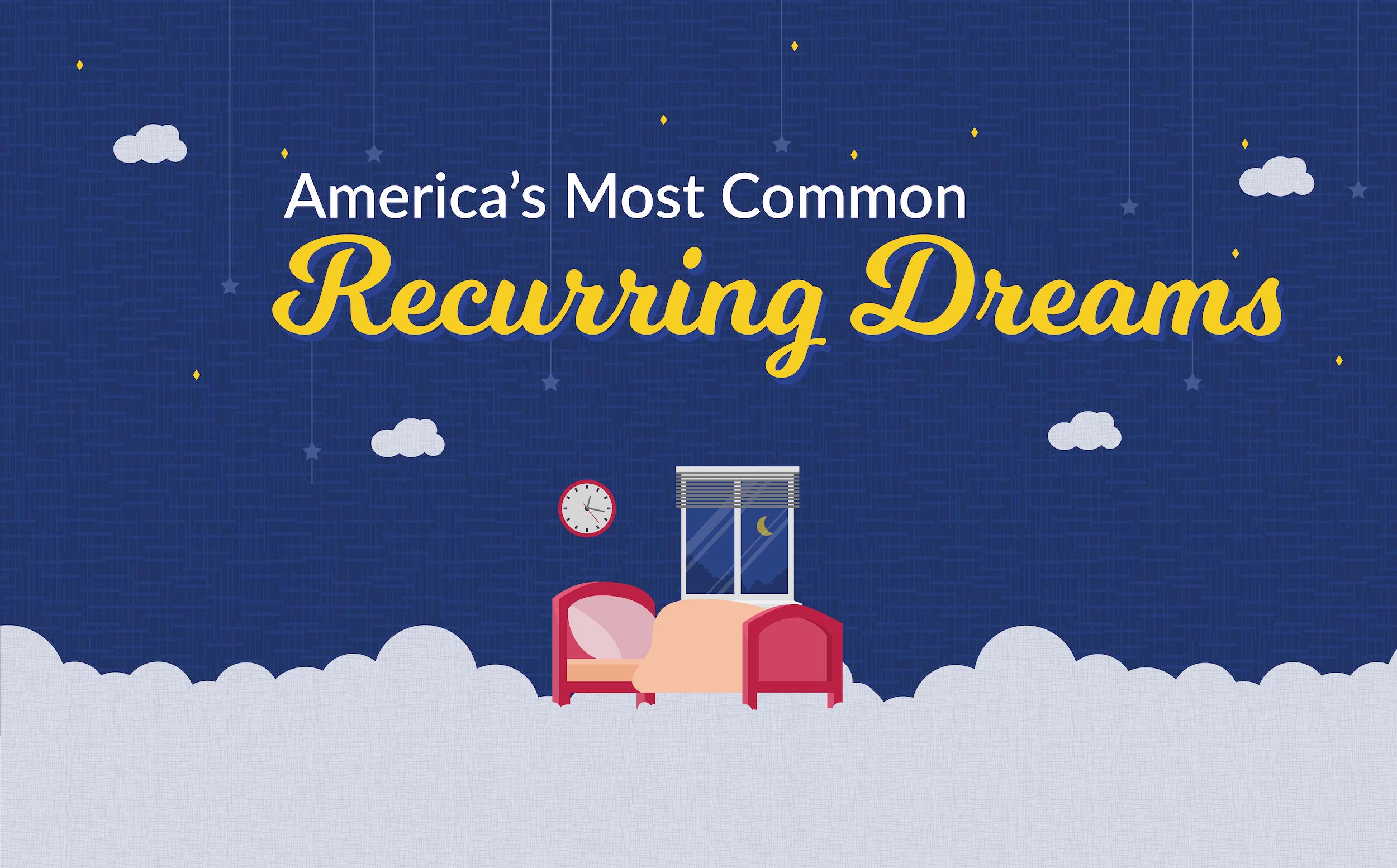Key Takeaways
- Common Recurring Dreams: The survey identifies the most prevalent recurring dreams among Americans, including falling, being chased, being back in school, and being unprepared for important events. These themes often reflect underlying anxieties, reflecting the prevalence of anxiety disorders in the U.S.
- Factors Influencing Recurring Dreams: The survey reveals that recurring dreams can start at any point in life, with childhood being the most common time of onset. Moreover, certain professions are associated with specific recurring dreams, while the geographic location of individuals does not seem to significantly impact the prevalence of recurring dreams.
- Sleep Habits and Dreaming: Many individuals get 6 to 8 hours of sleep each night, but certain practices such as using electronic devices before bedtime may impact the quality of sleep and contribute to anxiety-induced dreams. Gender may influence dream recall and types of dreams, with women more likely to remember dreams and have anxiety-related dreams, while men are more likely to have positive dreams.
Everyone has weird dreams – whether we’re falling through the air, being chased through the streets, or losing our teeth. And most of us have had the same weird dream more than once.
What are the most common recurring dreams we have? How early in life do those dreams start? And how do things like gender, location, or profession impact our nighttime illusions?
We surveyed over 2,000 people scattered throughout the U.S. and across a variety of industries to find out. Here’s what our research revealed.
The Most Common Things Americans Dream About
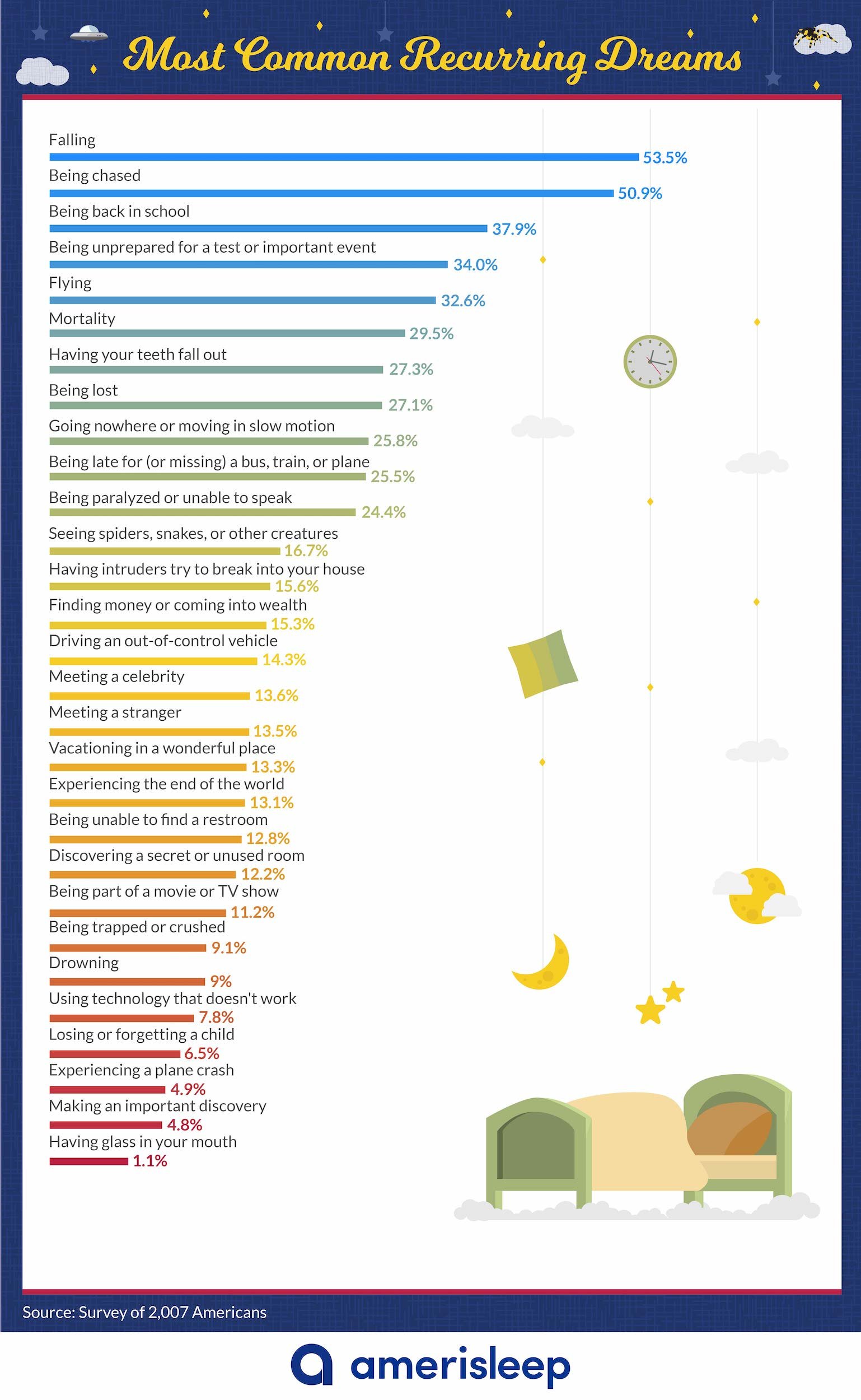
When we asked our respondents what they dream about over and over again, the most common answer was falling. It turns out that about 54 percent of those surveyed have experienced this heart-pounding dream before.
Also common were dreams about being chased (51 percent), being back in school (38 percent), and being unprepared for a test or important event (34 percent).
The psychology here makes a lot of sense, considering that these dreams are about anxiety-provoking situations. According to the National Institutes of Mental Health, Verified Source Anxiety and Depression Association of America (ADAA) Nonprofit organization that promotes awareness about anxiety and depression. View source anxiety disorders are the most common mental illness in the U.S.
Also fairly common: dreams about flying and interacting with someone who has passed.
When Do Recurring Dreams Start?
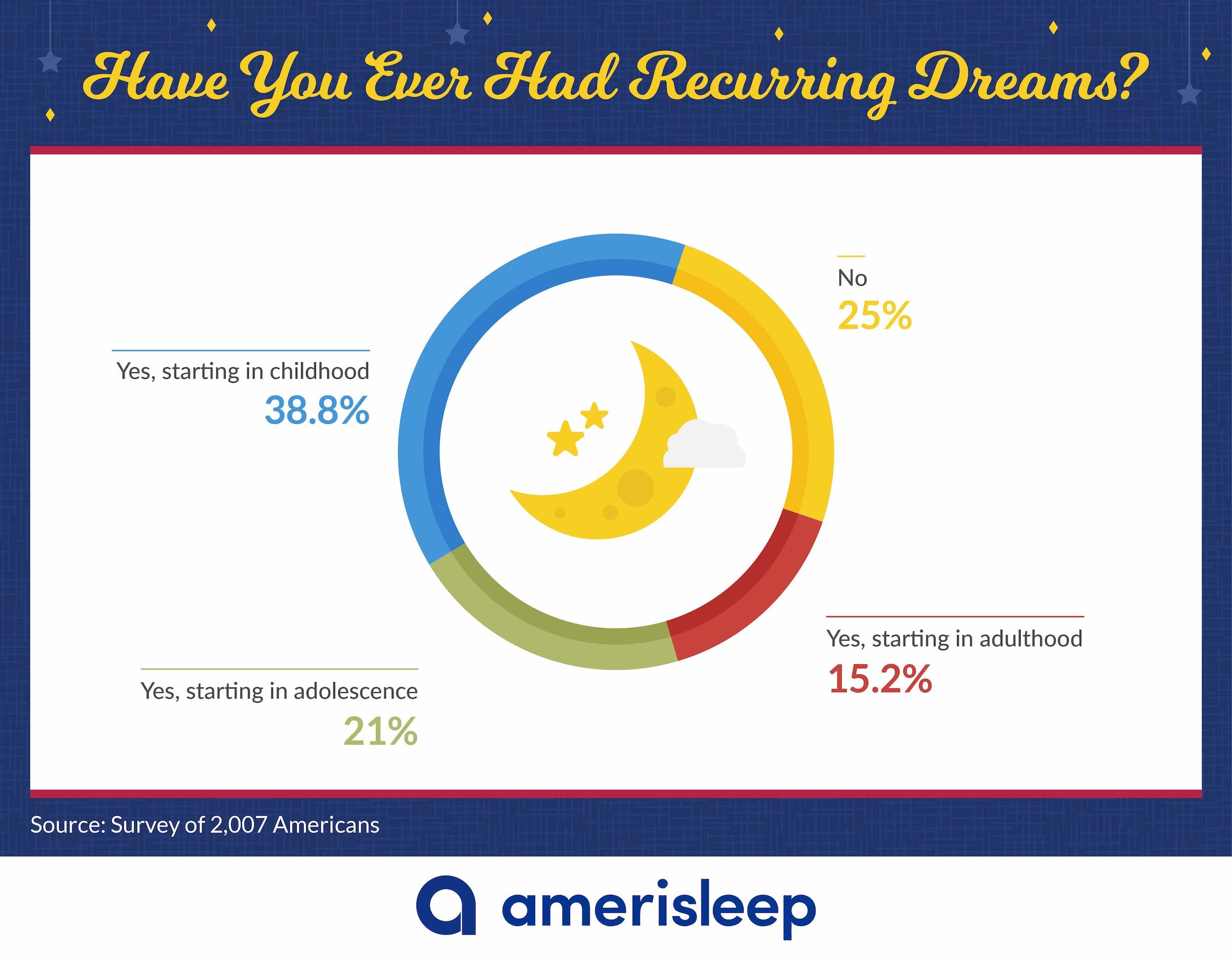
Do you remember when you first started to have recurring dreams? While these themes often start at a young age, recurring dreams can actually begin at any point in one’s life. When it came to our survey respondents recalling when their recurring dreams first started, the results were mixed. Was it in childhood or adolescence? As an adult? Or were they one of the rare few who has never had one at all?
The most common answer, by far, was childhood; nearly 39 percent of those surveyed said their dreams started in the early years of their lives. At the same time, 21 percent indicated that their recurring dreams started in adolescence, and 15 percent said theirs started in adulthood. Interestingly, 25 percent of our survey takers admitted that they have never had a recurring dream.
Do Our Professions Affect Our Dreams?
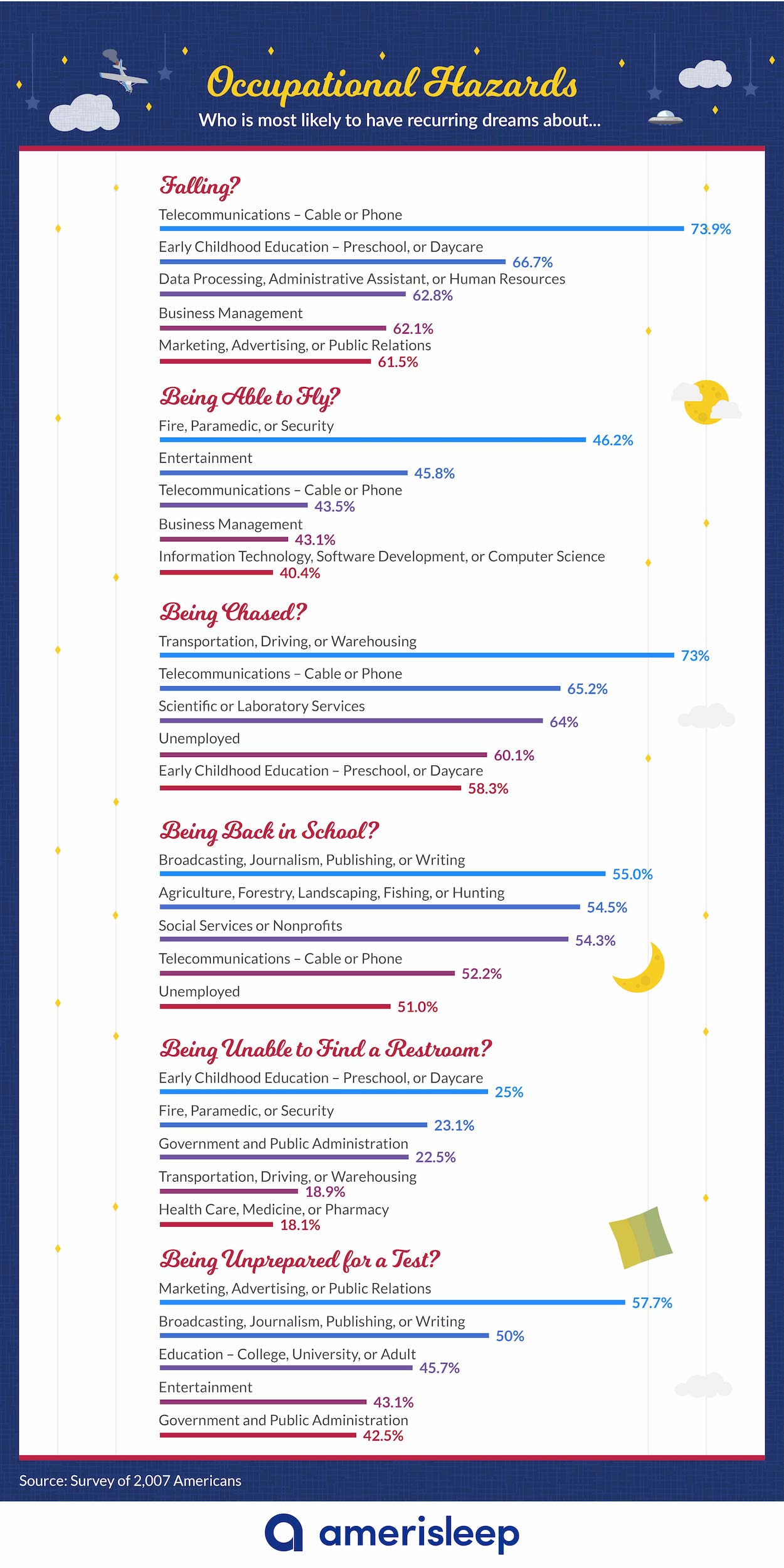
You’re not dreaming this: People in certain professions are more likely to have certain dreams.
Preschool teachers are inclined to have the “can’t find a restroom” dream on a recurring basis, and truck drivers are most likely to dream about being chased. Cable installers often dream of falling. Paramedics, on the other hand, are likely to dream they can fly.
People who communicate for a living – advertisers, journalists, and college professors – are most likely to dream about being unprepared for a test.
The Geography of Recurring Dreams
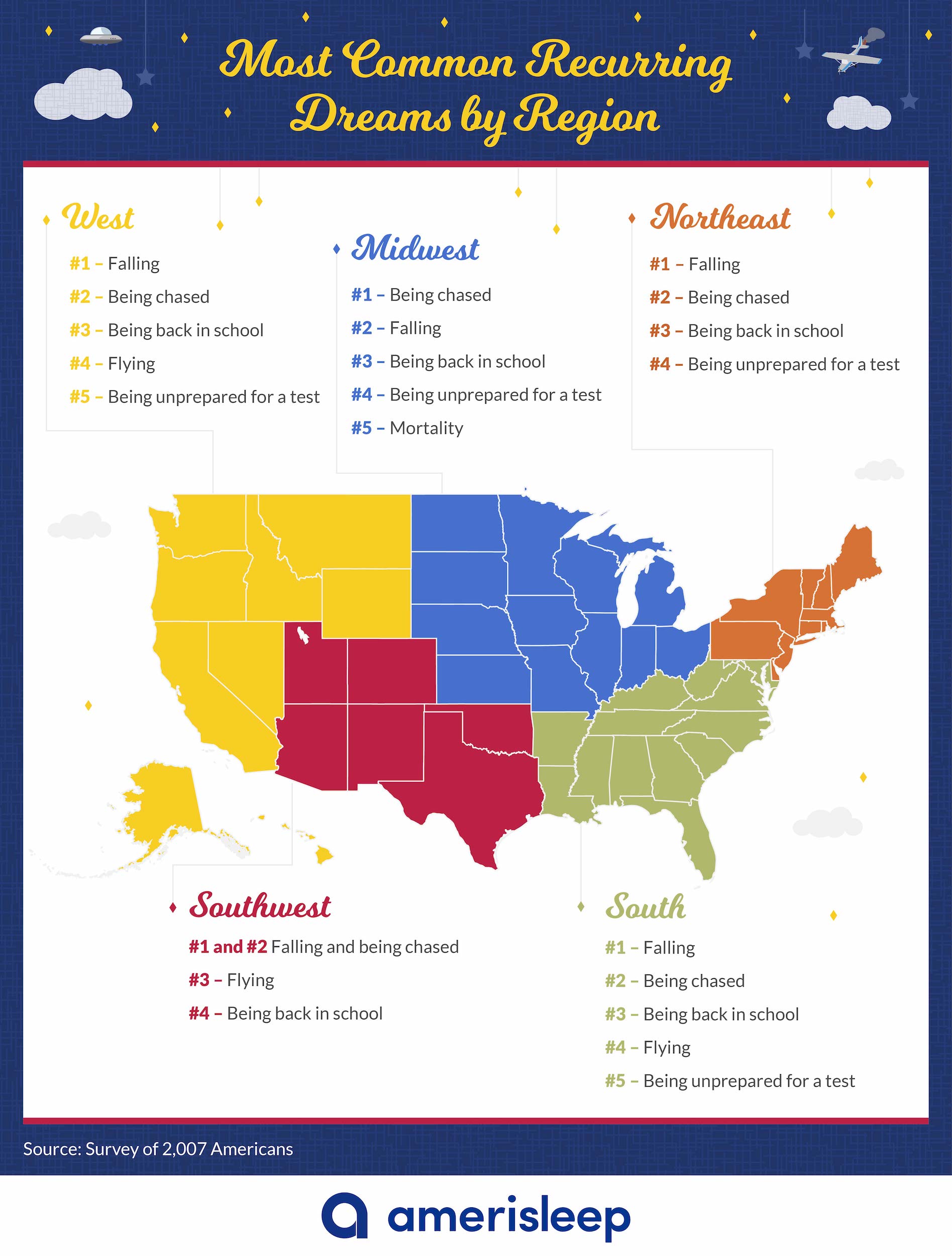
It’s clear that our dreams and our professions are tied together, whether that connection is causal or correlated. But what about where we live? Does our location have a connection to our nighttime narratives?
Turns out that no matter where you live in the U.S., the most prevalent dreams are the same. Falling is the No. 1 dream everywhere except for the Midwest, where it ranks No. 2. Being chased follows closely, with it either tying for first place or ranking a close second across the board. Even being back in school seems to be a major concern. Dog ate your homework?
The Sleep Habits of Our Dreamers
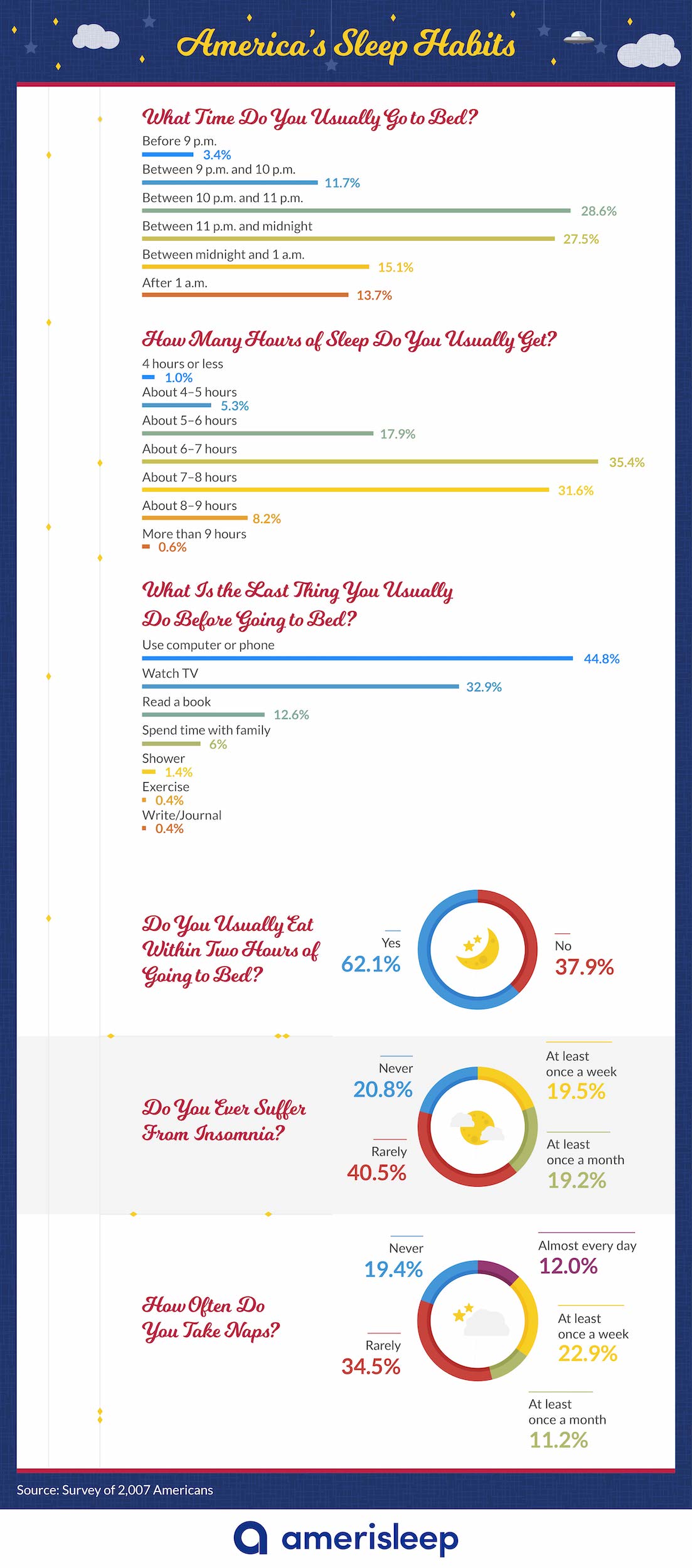
While we were asking about recurring dreams, we also asked our survey takers about their sleeping habits. We got some interesting answers.
Our respondents go to bed between 10 p.m. and midnight and get about 6 to 8 hours of sleep each night. Specialists recommend that adults shoot for 7 to 9 hours of sleep per night – so this is a good sign.
However, most of us admit to using a computer or phone right before going to sleep, which is a big no-no according to most experts, as it impacts your sleep quality and your alertness the next day. Additionally, 62 percent of respondents admitted to eating within two hours of going to bed, and about 35 percent said they rarely take naps. Could it be that some of these factors are playing into our anxiety-induced dreams?
How We Dream When We Dream
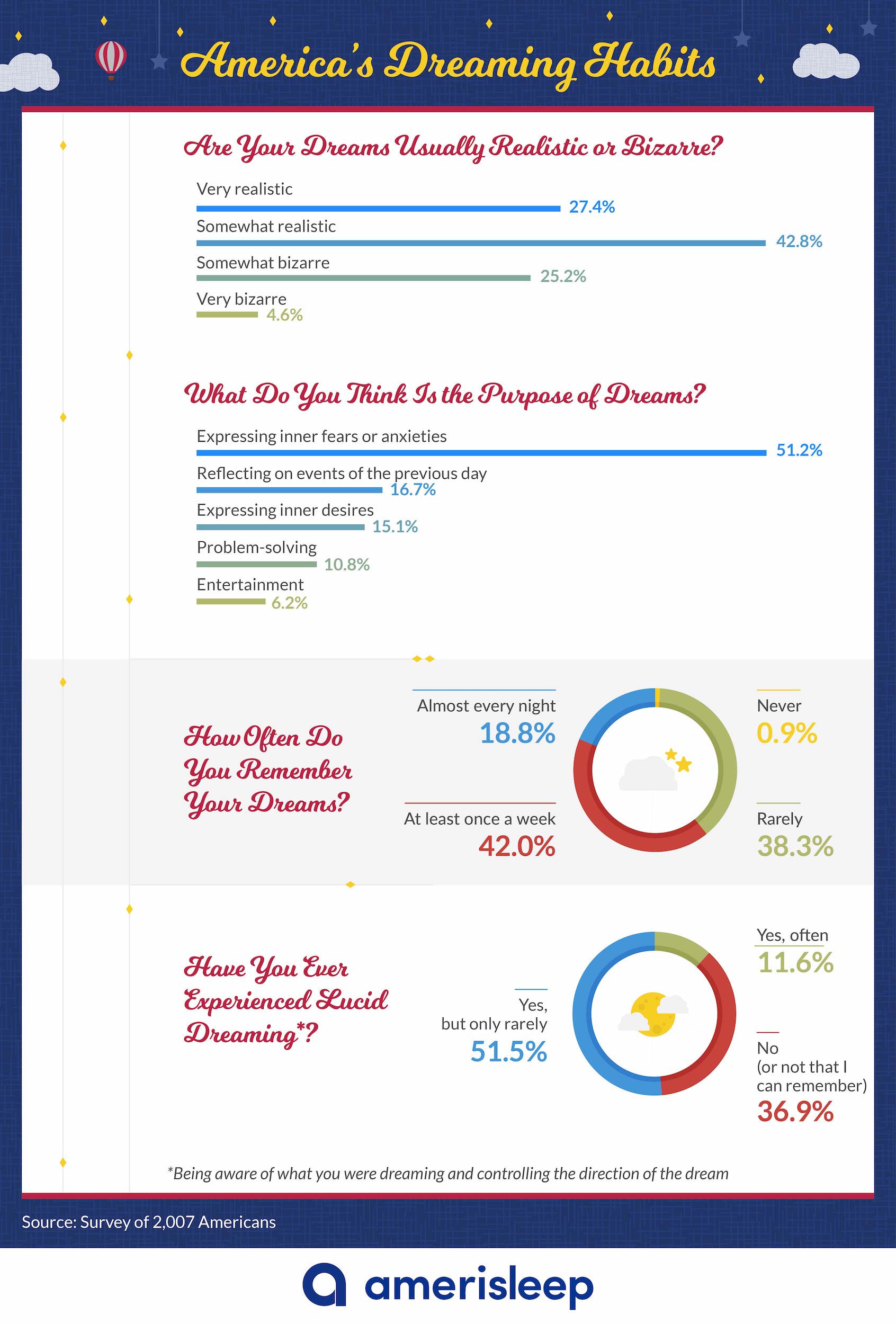
When it comes to dreaming of falling, being chased, or losing our teeth, what’s the rest of the story?
According to our findings, most dreams are somewhat realistic (about 43 percent), and most respondents (51 percent) think the purpose of their dreams is to express their inner fears and anxieties. Further, 42 percent of people say they remember their dreams at least once a week. Over 51 percent say they’ve had lucid dreams at some point in their life, in which they knew they were dreaming and had some control over the direction of the dream.
What’s Gender Got to Do With It?
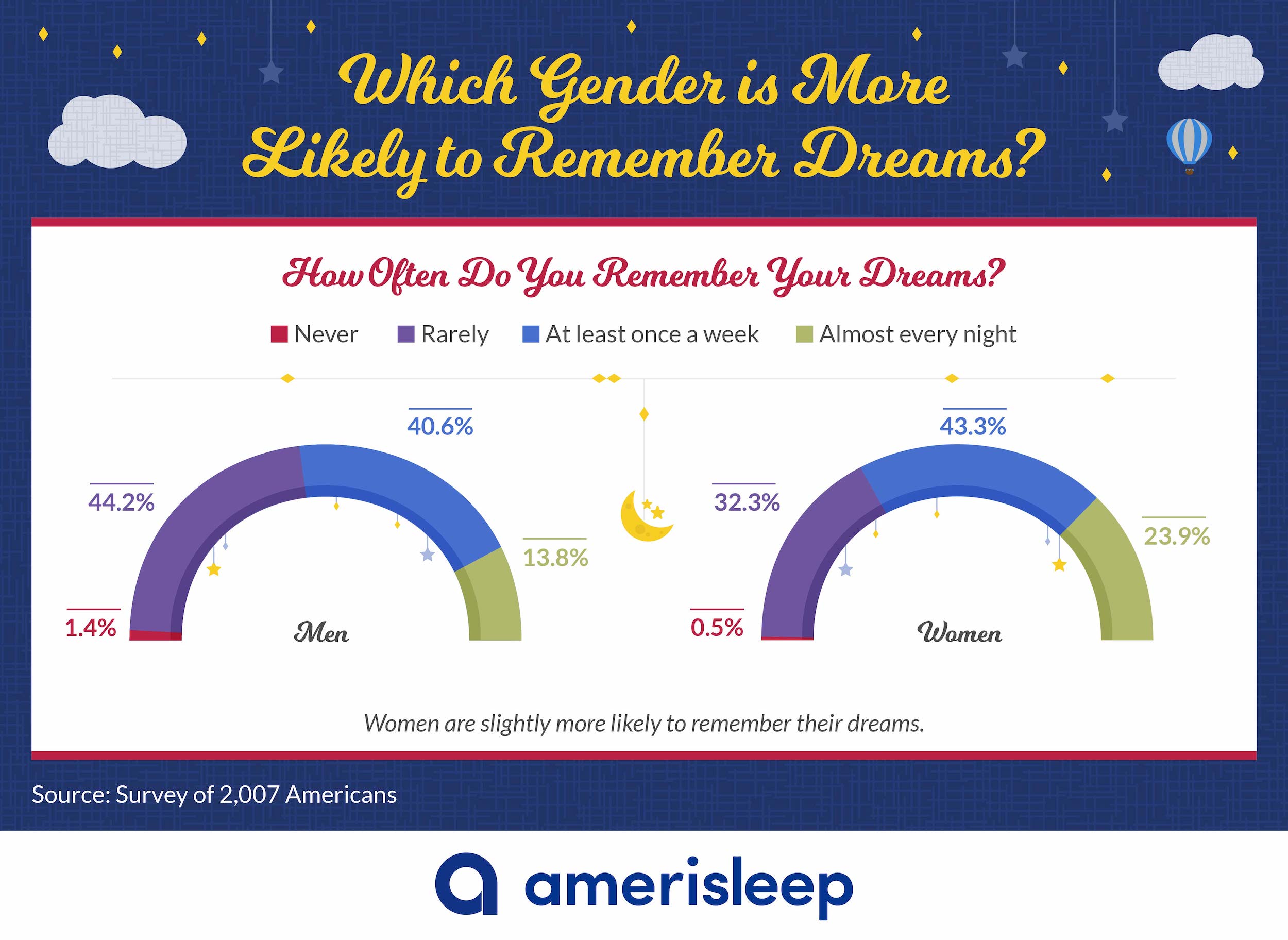
As we were wrapping up our dream research, we also wondered how this data stacked up between genders. Who was more likely to remember their dreams? And does gender impact which dreams you’re most likely to have?
It turns out, women are more likely than men to remember their dreams, which makes sense considering that women have better short-term memory for daily events, according to the Association for Psychological Science. Looking at the results, about 43 percent of women indicated they remember their dreams at least once a week, while about 41 percent of men remember the same. Notably, about 24 percent of women remember their dreams almost every night versus about 14 percent for men.
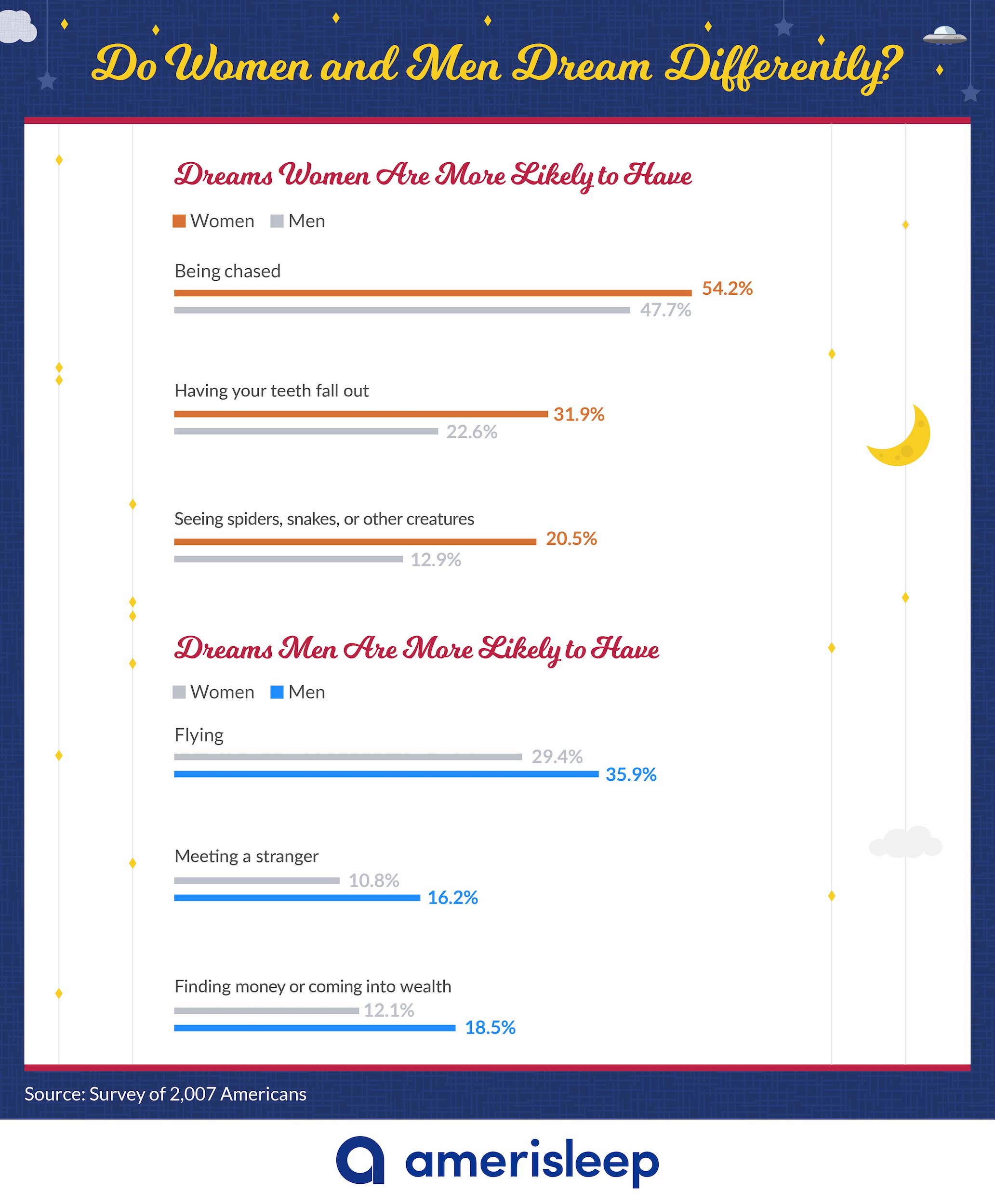
Men and women also reported a marked difference in the types of dreams they have. Women are more likely to dream about being chased or losing teeth. Men, conversely, are more likely to have positive dreams, such as flying or getting rich.
Whether this difference is due to women having more innate anxiety or stressful lives is up for debate, but the difference is interesting nonetheless.
Conclusion
If you’ve been dreaming for years about falling off a cliff, running from a faceless stranger or moving in slow motion, you’re definitely not alone. Recurring dreams, especially of the anxiety-inducing sort, are common throughout the U.S.
So what can we do to minimize our nightmares and maximize our restful sleep? For one, 93 percent of Americans say a comfortable mattress is important for a good night’s sleep. Experts agree that reducing your day-to-day stress also helps you sleep better. And room temperature, Verified Source National Library of Medicine (NIH) World’s largest medical library, making biomedical data and information more accessible. View source what and when you eat, and technology all matter a lot as well.
You can also try to understand the cause and meaning of a dream. This is something you can try alone with a dream journal, or you can try to speak with a cognitive behavioral therapist to tease out potential shades of meaning.
Methodology
We conducted a survey of 2,007 U.S. residents. Respondents were 49.9 percent male and 50.1 percent female and ranged in age from 18 to 74. They came from all 50 states, plus the District of Columbia.
Fair Use
Rest easy knowing that we grant permission for you to share the images found here in your publication. Just don’t sleep through the alarm: We request that you link back to this page to give the authors proper credit.
About the author
McKenzie Hyde is a Certified Sleep Science Coach and a full-time writer specializing in sleep health and the mattress industry. With a Master of Arts degree in literature and writing from Utah State University, McKenzie combines her passion for writing with her in-depth knowledge of sleep science. Her articles cover a wide range of topics, including best sleep practices for students, the consequences of sleep deprivation, and choosing the right mattress for back pain relief. McKenzie's dedication to delivering accurate and informative content makes her a valuable contributor to the field of sleep health.
View all posts